Killer Coke Update | April 23, 2010
New York Premiere of "The Coca-Cola Case" Film Monday, April 26 at NYU
- 'The Coca-Cola Case' Premiere at NYU, Monday, April 26
- Campaign Raises Coke's Widespread Human Rights Abuses at Annual Meeting
- Campaign at New York University, New York, NY
- Article on Stop Killer Coke in Minyanville
- Video, "Killer Cola-Just Do It," Civil Disobedience Belgium
- UK: Don't Drink Innocent Drinks! Coke Now Owns 58 Percent of the Company
- Coke Sued for Human Rights Abuses in Guatemala
- A New Cola in Bolivia
- Health Issues & Coke: Diabetes, Obesity, Additives
- Water Depletion in India
- A Coca-Cola Rip-Off of the Consumer
1. "The Coca-Cola Case" Premiere at NYU, Monday, April 26
On Monday, April 26, there will be a screening of "The Coca-Cola Case" at NYU. The new flyer, which is currently being distributed on campus states:
"A new documentary, 'The Coca-Cola Case,' a film which focuses on labor and human rights abuses, the legal cases brought against The Coca-Cola Company and its Colombian bottlers and the Campaign to Stop Killer Coke will be shown at New York University at Tishman Auditorium, Vanderbilt Hall, on April 26 at 7 pm. The showing will be free and open to the public.
"The film, produced by the National Film Board of Canada and filmmakers German Gutierrez and Carmen Garcia, highlights the role of the United Steelworkers, the International Labor Rights Fund and Campaign to Stop Killer Coke Director Ray Rogers, who the Financial Times called "the company's fiercest foe" in their struggle to bring justice to Coca-Cola bottling plants in Colombia. At this showing, Carmen Garcia, German Gutierrez, Ray Rogers and NYU Law student and SINALTRAINAL member Camilo Romero will be present to answer all questions.
"The Coca-Cola Co. tried to suppress showings of the film by sending a letter threatening legal action against the National Film Board of Canada, grassroots film collective Cinema Politica and Alliance, the sponsor of a Human Rights Film Festival in France. However, the film has been shown to packed theaters in Canada, France, Spain, and Sweden. Concordia University's The Link wrote: 'Concordia-based film collective Cinema Politica received a threatening letter on Jan. 11 from the lawyers for Coca-Cola stating that the network's planned film tour for documentary The Coca-Cola Case violates a confidentiality agreement.'
"In 2005, New York University made headlines when the University Senate pledged its commitment to human rights by kicking Coca-Cola off campus. Four years later, the Senate turned its back on these principles, failed to live up to its own resolution and invited Killer Coke back to NYU, leaving many students angry. Why are NYU administrators helping cover up Coke's crimes? Students of NYU have to ask themselves what they want the University to represent: the longstanding support of human rights and support of ethical companies or kowtowing to corporate millionaires."
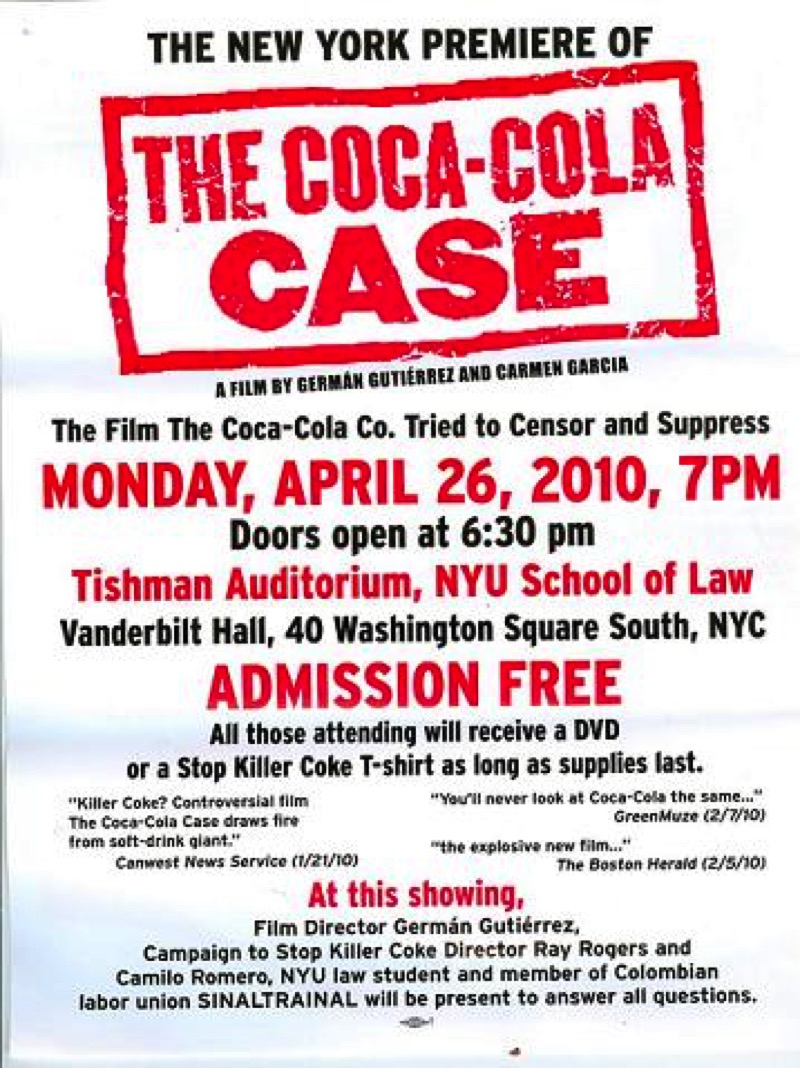
Jam Showbiz Movies, "Coca-Cola Case' packs plenty of pop, By Liz Braun
Read Article
"[Terry] Collingsworth managed to move the showdown, legally speaking, to the United States, allowing Colombians to sue Coca-Cola in the U.S. for crimes committed elsewhere. The cases that were filed against Coca-Cola included such items as murder, abduction, kidnapping and torture. The Coca-Cola Case makes it clear that while these crusaders are making headway, it's still very difficult for Coke drinkers in first-world countries to grasp the level of violence and corruption involved in labour disputes elsewhere. Kids at the University of Chicago are shown parading stupid signs ('F--- Human Rights') when Ray Rogers comes to speak, because they don't want anything to stop their freedom to drink Coca-Cola. It's a different story after they've heard Rogers talk, maybe, but it's sadly obvious that the plight of Coca-Cola workers in faraway places is not uppermost in the minds of most North Americans."
City News, "Documentary Looks At Labour Rights Case Against Coca-Cola," By Brian McKechnie, March 25, 2010
Read Article
"The Coca-Cola Case is an eye-opening documentary that looks at the labour dispute between unionists in Colombia and The Coca-Cola Company, which is accused of 'alleged kidnapping, torture and murder of union leaders trying to improve working conditions in Colombia, Guatemala and Turkey.' Using interviews with the lawyers involved in the case against Coke, workers in the bottling plants, and Ray Rogers, the man behind the Stop Killer-Coke! Campaign, the film exposes the lack of human rights large corporations such as Coca-Cola function on, and get away with, in these smaller countries."
rabble.ca, "Coca-Cola doc chronicles a bitter battle," By June Chua, April 8, 2010
Read Article
"'As soon as the union was formed, the trouble started,' intones the brother of murdered Columbian union leader Isidro Gil ominously at the start of The Coca-Cola Case, a documentary co-production by the NFB and Argus Films.
"The 86-minute film chronicles the relentless efforts of American lawyers trying to take the soft drink giant to court over the killings of 10 union leaders, who represented workers at Coke bottling plants in Colombia...
"...The Coca-Cola Case is a fascinating portrayal of corporate irresponsibility and greed."
2. Campaign Raises Coke's Widespread Human Rights Abuses at Annual Meeting
Members of the Campaign to Stop Killer Coke traveled to Duluth, Georgia, for the 2010 annual meeting. We linked up with the India Resource Center, Corporate Accountability International (CAI) and the International Brotherhood of Teamsters Local 728 at the Gwinnett Center where the annual meeting was being held.
The Campaign's mobile billboard was seen by many driving around the Center playingDavid Rovics's "Drink of the Death Squads."
At the meeting, our Campaign emphasized the human rights abuses in China, Colombia, El Salvador, Guatemala, India and Mexico; the India Resource Center focused on Coke's overexploitation and pollution of water resources in India; CAI called for Coke to honestly label their Dasani bottled water in their "Open Tapiness" campaign and the Teamsters were concerned about how Coke was interfering in their attempts to organize workers and the changes that the Company was making in the delivery of Coke to outlets which the union fears will cost jobs.
There were six items on the agenda — Election of Directors, Election of Auditors and four shareholder resolutions. As usual all shareholders resolutions were opposed by the Board. Nearly all the speakers from the floor were angry at and critical of Coke and dominated the meeting.
CEO/Chair Muhtar Kent followed the example of former CEO/Chair E. Neville Isdell. He denied any wrongdoing on the part of the company. However, he did admit that with such a large corporation with so many employees, it's possible that some wrongdoing might take place, but denied it was company policy.
We will include a more detailed report in our next newsletter. Following are a few articles published after the annual meeting:
The Atlanta Journal-Constitution, "Mixed emotions at Coca-Cola annual meeting," By Jeremiah McWilliams, April 21, 2010
Read Article
"Ray Rogers, a longtime Coca-Cola foe and organizer with the Campaign to Stop Killer Coke, was the first to jump to a microphone when the floor was opened for shareholder questions. He accused the company of 'bullying and intimidation tactics' in South American labor practices."
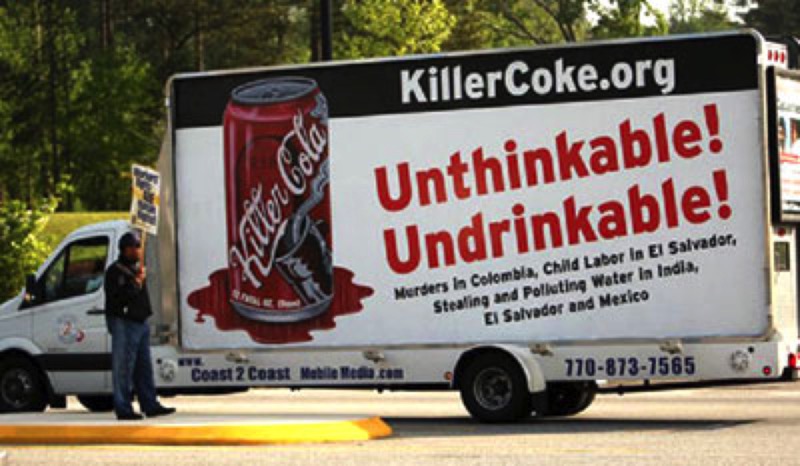
The Atlanta Journal-Consitution
Free Speech Radio News, "Advocates press Coca-Cola on destructive practices in India"
Listen to interview with Amit Srivastava
"Today, Coca-Cola company held its annual shareholders meeting in Atlanta. Coca-Cola generated $8.2 billion in profits last year. In India
— a country the company calls a key emerging market — sales increased by 21 percent in the last quarter of 2009. But critics say this growth has a tremendous price on the local communities and the environment, where the company oversees more than forty bottling plants and is the largest domestic buyer of sugar. Last month, a government committee in Kerala found that Coca-Cola should be held liable for $48 million in damages and was responsible for residents' health problems and water pollution.
"These issues were brought to the shareholders meeting today by Amit Srivastava, coordinator with the India Resource Center, an advocacy organization that monitors globalization in India. He joins us by mobile phone in Atlanta."
Reuters, "Coke CEO aims to ease union fears over delivery routes: Coke CEO says that 7-Eleven test is just a test," By Martinne Geller, April 21, 2010
Read Article
"A handful of Teamsters members handed out fliers and held placards outside the meeting venue in Duluth, Georgia, near Coke's Atlanta headquarters. 'We have some concerns about the way Coke is doing their business ... Our main concerns are treatment (of workers), fairness and the direction the company is taking,' said national Teamsters organizer Steve Jones."
Background: Reuters, "Teamsters say Coke pilot plan could cut jobs: Coke bottler to test new plan w/7-Eleven, Costco," By Martinne Geller, April 16, 2010
Read Article
"Teamsters say hundreds of jobs could be on the line...Coca-Cola Enterprises Inc. is testing a new method of delivering Coca-Cola drinks to 7-Eleven stores in Southern California, using Costco Wholesale Corp. as an intermediary.
"The test was first disclosed by officials from the Teamsters labor union, which said it had the potential to eliminate hundreds of union jobs, since it involves the use of a third-party logistics company in addition to employees of Coca-Cola Enterprises, which produces, bottles and distributes Coke drinks."
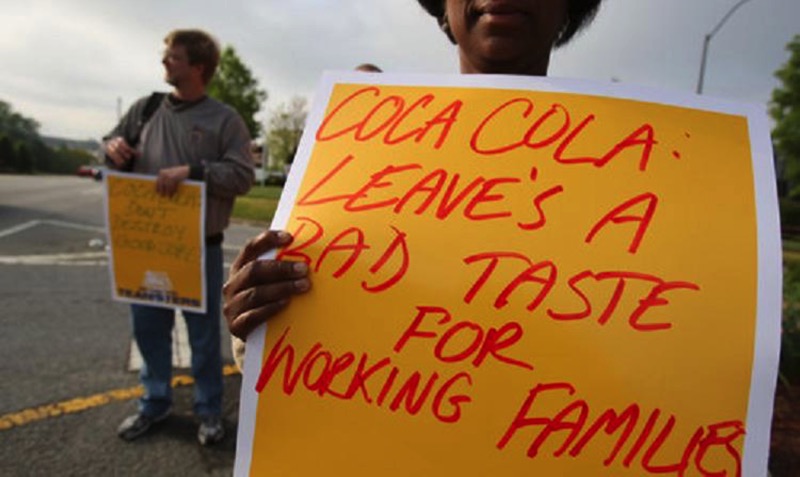
The Atlanta Journal-Consitution
QSR Web, "Coca-Cola shareholders to challenge use of Bisphenol-A in cans," April 21, 2010
Read Article
"Scientific studies indicate that BPA is an endocrine-disrupting chemical that mimics estrogen in the body. Numerous animal studies link BPA, even at very low doses, to changes in brain structure, immune system, and male and female reproductive systems changes. A recent study in the Journal of the American Medical Association links BPA exposures in humans to cardiovascular disease, diabetes and liver enzyme abnormalities. Health Canada, a Canadian federal agency, has warned that BPA can leak into beverages."
3. Campaign at New York University
Over the past month, a team working with the Campaign to Stop Killer Coke distributed more than 10,000 copies of the following flyer to the NYU community. Distribution of the flyers will continue. The flyer focuses on Coke's human rights and environmental abuses and on NYU Trustee Barry Diller. Diller is also one of 14 members of the Board of Directors that sets policy for The Coca-Cola Company.
The flyer points out:
"In 2005, New York University made headlines when the University Senate pledged its commitment to human rights by kicking Coca-Cola off campus. Four years later, the Senate turned its back on these principles, failed to live up to its own resolution and invited Killer Coke back to NYU, leaving many students angry. As Jeff Olshansky, the co-chair of NYU Law Students for Economic Justice said, "NYU made a promise to these Colombian workers and they broke that promise. NYU decided to put their financial relationship with Coke above human rights."
"Coincidentally," Diller purchased $20 million of The Coca-Cola Company stock in March 2009, only weeks after NYU reversed their ban on Killer Coke.
Students are calling on NYU to dump Coke, dump Diller and reaffirm its commitment to Human Rights and Social Justice.
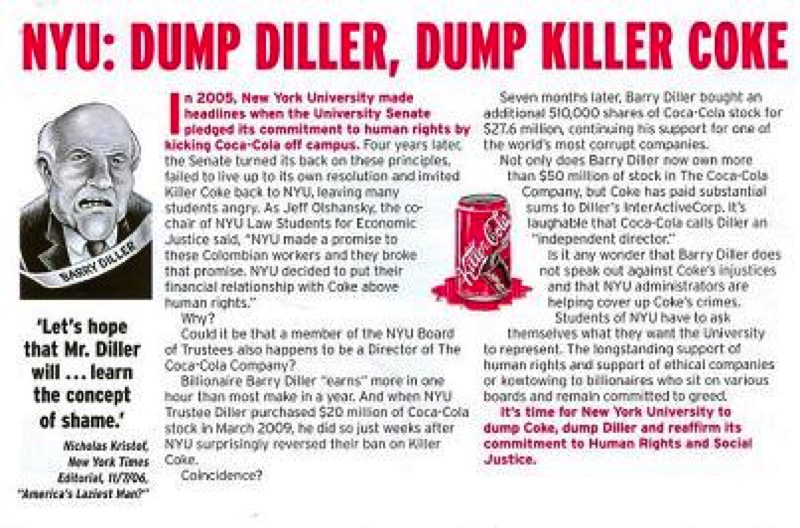
4. Article on Stop Killer Coke in Minyanville
Minyanville, "Skeletons in the Corporate Closet: Coke," By Justin Rohrlich, April 6, 2010
Read Article
Dan Kovalik: "Imagine the White House with a radical free market political agenda with no room in it for trade unions," he tells Minyanville. "Then, picture the Michigan Militia being pressed into service by the government, with assistance from the US military, to eliminate organized labor. It sounds absurd, but that's what we're dealing with in Colombia..."
"Dr. Lesley Gill, Ph.D. , chair of the anthropology department at Vanderbilt University who studies Latin American labor relations, tells Minyanville that, 'The claim that bottlers are independent is nothing more than a smokescreen. To think of them as a separate legal entity is really just sort of a legal fiction, a legal sleight of hand to enable corporate headquarters in Atlanta to avoid being accountable for what goes on in the plants that bottle their products.'
"Others agree.
"You just can't...say: 'They're the bottlers, we just sell the syrup,' " Edward F. Ahnert, a former president of the ExxonMobil (XOM) Foundation who teaches corporate social responsibility at Southern Methodist University's business school, said in an interview."
Read Article in WalletPop (11 of 12)
What is Minyanville? The following is from Minyanville's website.
"Minyanville Media, Inc. (MMI) is an Emmy Award winning content and community platform. MMI creates branded business content that informs, entertains and educates all generations about the worlds of business and finance. Minyanville is a place where people who seek useful, unbiased information come to learn, laugh and connect. MMI strives to raise the level of financial understanding by connecting with a highly desirable audience through insightful commentary laced with humor and humanity. This distinguishes MMI by creating a true intersection of Wall Street and Main Street.
"Minyanville.com is an Emmy Award-winning destination site with more than 1.3MM unique visitors and 8-10MM per month. According to Google, Minyanville.com was the second fastest growing financial and business destination in 2008. According to Quantcast, Minyanville.com reaches the most affluent, college educated, 35-64 year old demographic in the category, consistently ranking in the top five Quantified web sites. Minyanville provides a portfolio of applications and subscription products geared toward the professional and active trading and investing audience. Licensed by many of the worlds largest financial institutions, Minyanville provides lead-edge solutions and content that generate ideas and build community.
"Minyanville Media has created unique digital content and destinations providing marketers a dynamic platform to connect with high-valued audience segments. Anchored by the flagship site Minyanville.com, Minyanville is quickly becoming the go-to destination for people wanting to know what's happening in business and finance before it happens. The site features a roster of more than 40 world-class "Professors" comprised of traders, money managers and some of the best minds in business media. Minyanville's mission is to effect positive change through financial understanding, from the the ABC's to the 401(k)'s."
5. Video, "Killer Cola-Just Do It," Civil Disobedience Belgium
Watch Video: "Killer Cola-Just Do It
6. UK: Don't Drink Innocent Drinks! Coke Now Owns 58 Percent of the Company
Innocent Drinks: New Coke Beverage
managementtoday.com, "Innocent until proven guilty over Coke deal?" April 12, 2010
Read Article
"The Innocent boys are on the defensive after agreeing to sell a further 40% stake to Coca-Cola. Innocent has always made great play of its almost anti-corporate, eco-friendly, health-conscious credentials. So it's no surprise that it's taken a lot of stick after agreeing to let global behemoth and sugary drinks purveyor Coca-Cola increase its stake to 58%."
Treehugger, "Innocent Drinks Sells (Out?) Some More to Coca Cola," by Bonnie Alter, April 12, 2010
Read Article
"While some were skeptical about the sale of an ethical healthy smoothie business to Coke, the owners said that they needed the capital to expand the business. To the horror of many, they have just sold 40% more, so that Coke now owns a majority 58% stake in the business."
domain-b, "Coca-Cola raises stake in UK's Innocent Drinks to 58 per cent news," April 10, 2010
Read Article
"Coca-Cola, the world's largest soft drink maker has taken a majority stake in British smoothie maker Innocent Drinks, but has left operational control of the business with its founders."
7. Coke Sued for Human Rights Abuses in Guatemala
NACLA (North American Congress on Latin America), "Coca-Cola Sued for ?Campaign of Violence' in Guatemala," By Lisa Skeen, April 7, 2010
Read Article
"While Coke's commitment to human rights may be nothing more than a self-serving publicity ploy (the company's corporate responsibility office is managed through its Public Policy and Corporate Reputation Council), it may have unwittingly backed itself into a legal corner. If a court does find Coca-Cola guilty, the case could bring the company to task for the anti-labor violence and further establish a legal precedent for international corporate responsibility. Palacios and Ch?vez are not the first to sue Coca-Cola, and they are unlikely to be the last."
Wind Times of Chile, "Putting the Coca Back In Cola: Bolivia launches new coca leaf energy drink," By Laura Bugoine, April 6, 2020
Read Article
"A group of farmers in Central Bolivia's Chapare region of Cochabamba have created an energy drink 'Coca Colla' named after the Colla people: Andean tribes who cultivated the coca plant in the high mountain areas bordering Bolivia, Chile and Argentina...The Coca-Cola Company imports eight tons of coca leaves from South America each year."
9. Health Issues & Coke: Diabetes, Obesity, Additives
ABC News, "Diabetes expert wants Coke out of communities," April 1, 2010
Read Article
"A diabetes researcher says Coca-Cola should withdraw from the Northern Territory's community stores if it really wants to make a difference to Indigenous health."
Gather, "Top 10 Reasons to Give Up Soda," By Steve Edwards, April 1, 2010
Read Article
"If you're looking for a scapegoat in the obesity epidemic, look no further than soda. It's the single greatest caloric source in the world, accounting for somewhere between 11 and 19 percent of all the calories consumed worldwide. It's cheap, addictive, and readily available, which generally means that it will take some willpower to avoid. But don't despair, as we at Beachbody? are here to help. We present: our top 10 reasons to give up soda. Drumroll please."
The Modesto Bee,"Living with children," By John Rosemond, April 6, 2010
Read Article
"A group calling itself the Nutrition Foundation published statements claiming that Feingold's approach lacked valid scientific support. The general public was unaware, however, that the Foundation's membership included Dow Chemical, Coca Cola, and other companies who made, used, and distributed the additives Feingold was targeting. In their zeal to discredit Feingold and his work, NF subsequently funded several research studies designed to 'prove' what it wanted the public to believe - that Feingold's approach was worthless...research continues to explore the efficacy of Feingold's approach, and there is growing reason to believe that Feingold was onto something of value."
Express News Service, "VS: Govt considering report against Coke," March 31, 2010
Read Article
"The report held that besides causing heavy depletion of ground water, the plant had inflicted harm to farming and environment in the area by dumping solid waste."
India Resource Center, "Coca-Cola Suspected of Sucking the Land Dry," By Amrit Dhillon, South China Morning Post, March 28, 2010
Read Article
"Sharma's son, Jagdish, 36, remembers being able to peer into the family well and see water in it. 'Ever since Coca-Cola came, we have to keep going deeper and deeper to extract water. Even at 45 to 60 metres down, we don't get water. Before Coca-Cola came, the water table used to sink every year but only by a couple of feet. Now it's five to six metres,' he says"
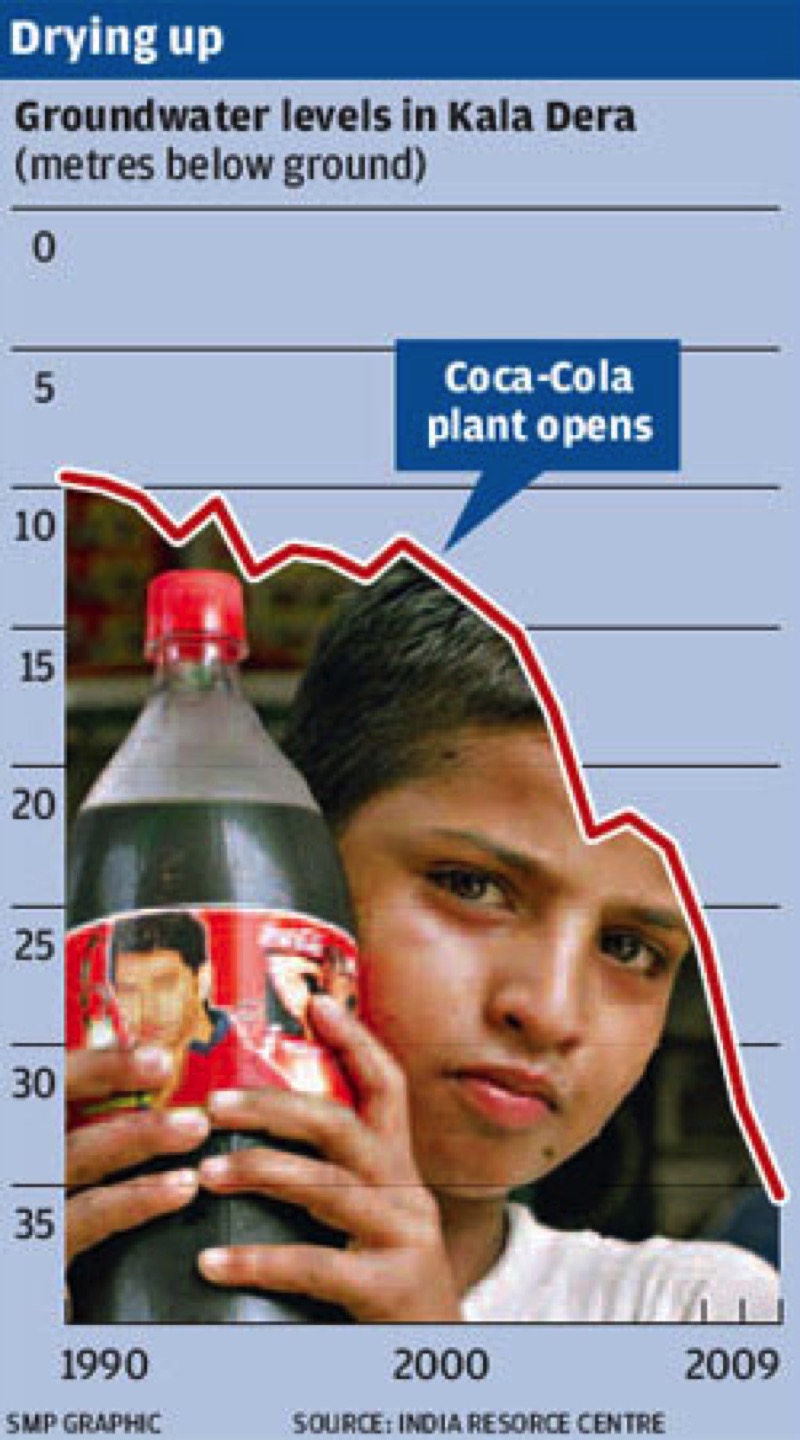
Free Speech Radio News, "Advocates press Coca-Cola on destructive practices in India"
Listen to interview with Amit Srivastava
"Today, Coca-Cola company held its annual shareholders meeting in Atlanta. Coca-Cola generated $8.2 billion in profits last year. In India
— a country the company calls a key emerging market — sales increased by 21 percent in the last quarter of 2009. But critics say this growth has a tremendous price on the local communities and the environment, where the company oversees more than forty bottling plants and is the largest domestic buyer of sugar. Last month, a government committee in Kerala found that Coca-Cola should be held liable for $48 million in damages and was responsible for residents' health problems and water pollution.
"These issues were brought to the shareholders meeting today by Amit Srivastava, coordinator with the India Resource Center, an advocacy organization that monitors globalization in India. He joins us by mobile phone in Atlanta."
11. A Coca-Cola Rip-Off of the Consumer
Star Tribune, "Tidbits: A new low from Coke: Coke introduces almost 8-ounce eight-packs," By Al Sicherman, March 31, 2010
Read Article
"In any case it is another high-price product. At the store where he saw them, the eight-packs were on special for $3.18, 'regular $4.08.' At that store, two-liter bottles of Coke products (almost always sold at a 'special' price, often as low as $1.25) were $1.69, 'regular $1.89,' and 12-packs of 12-ounce cans (144 ounces) were $4.59, 'regular $4.79.'
"At the 'special' prices he saw posted, Coke in the new eight-packs of small cans would cost 5.3 cents an ounce — an unbelievable 112 percent more per ounce than 2-liter bottles and 66 percent more per ounce than 12-packs of 12-ounce cans. (At those prices, if you like the idea of the smaller serving, it would be slightly cheaper to buy the 12-ounce cans and pour 41/2 ounces of each down the sink.)"
The Purdue University Calumet Chronicle, "Capitalism pops," By Ryan Riverside, April 12, 2010
Read Article
"As such, I cannot justly complain about the size of the new cans and bottles by themselves. It is the combination of the size and the price which is upsetting. The price of these half-sized drinks is the same, if not more than the price of a full-sized drink. Some ad campaigns have labeled them as "convenience size" or "diet size," but these marketing ploys only mask the truth: the drinks are being charged at double the price, per weight.
"The vast majority of companies downsizing would not need to, if only they reduced the wallet padding of their executives. Some of the world's executives make nine to ten figures a year. If they got their heads out of the clouds and lived on the same world we all do, many of society's problems would be eliminated. According to a study by the University of California at Santa Cruz, in America, the top percent of the wealthy own 43 percent of the assets. Conversely, the bottom 80 percent of people own, together, only seven percent of the wealth."











